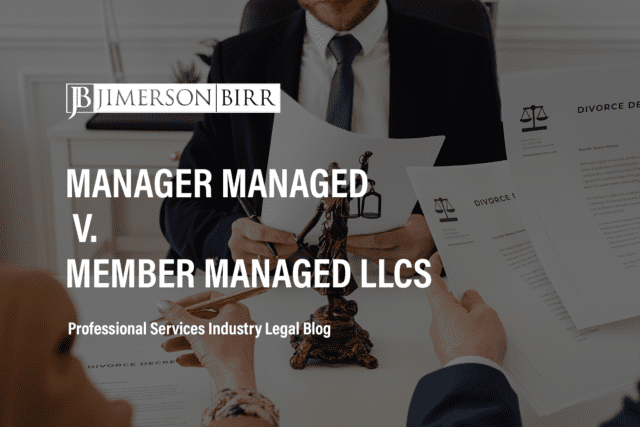What does entity planning, selection, and structuring entail?
Business entity planning, selection, and structuring involve determining the most suitable legal structure for a business venture. This process considers the business’s goals, liabilities, taxation, governance, and compliance with Florida and federal laws.
For example, corporate executives might consult legal counsel when deciding whether to form a limited liability company (LLC), a corporation, or a partnership. In another scenario, a board of directors may seek advice on structuring a merger, acquisition, or joint venture that complies with applicable laws and meets the company’s strategic objectives.
Need help with a matter related to entity planning, selection, and structuring? Schedule your consultation today with a top corporate governance and operations attorney.
Which Florida and federal laws and regulations apply to entity planning, selection, and structuring?
Key Florida statutes include the Florida Business Corporation Act (FBCA), which governs corporations, the Florida Revised Limited Liability Company Act (FRLLCA) for LLCs, and the Florida Revised Uniform Partnership Act (FRUPA) for partnerships.
At the federal level, the Internal Revenue Code (IRC) and regulations issued by the Internal Revenue Service (IRS) play a significant role in determining the tax implications of different business structures. Additionally, the Securities Act of 1933, the Securities Exchange Act of 1934, and Securities and Exchange Commission regulations establish comprehensive securities registration and reporting requirements for businesses.
What entity planning, selection, and structuring issues commonly lead to litigation?
The following issues are among the most common in litigation involving entity planning, selection, and structuring:
- Breach of Fiduciary Duty: Corporate officers, directors, and controlling shareholders may face litigation if they fail to act in the company’s or its shareholders’ best interest.
- Disputes Over Ownership and Control: Conflicts may arise among partners, shareholders, or members over allocating ownership interests, control, and decision-making authority within the business entity.
- Employment Disputes: Issues related to employment agreements, compensation, and benefits can lead to litigation involving the business entity.
- Intellectual Property Disputes: Disagreements over the ownership, licensing, or infringement of patents, trademarks, or copyrights can result in company litigation.
- Contract Disputes: Disagreements between parties to a contract, such as vendors, customers, or partners, can lead to litigation involving the business entity.
- Dissolution Disputes: Conflicts may arise during the dissolution of a business entity, including disputes over the distribution of assets, liabilities, and winding-up procedures.
What are effective measures to minimize the risk of litigation over entity planning, selection, and structuring?
Implementing the following strategies may help mitigate risk:
- Seek Legal Counsel: Engage experienced legal counsel to guide you through selecting, forming, and structuring your business entity in compliance with Florida and federal laws.
- Draft Clear Agreements: Prepare clear and comprehensive partnership, shareholder, or operating agreements that outline the rights and responsibilities of each party, dispute resolution procedures, and other essential terms.
- Implement Strong Corporate Governance Practices: Establish and maintain effective governance practices, including adopting bylaws and policies, holding regular board meetings, and maintaining accurate records.
- Regularly Review and Update Agreements: Periodically review and update your agreements, contracts, and other legal documents to ensure they meet your business’s needs and comply with applicable laws and regulations.
- Establish Effective Communication Channels: Foster open communication among partners, shareholders, or members to address issues and concerns before they escalate into disputes.
- Consider Alternative Dispute Resolution Methods: Include provisions in your agreements that require mediation or arbitration to resolve disputes, which can be faster and less costly than litigation.
When a set of facts is appropriate to meet litigation requirements, there are many paths a claimant may take. We are value-based attorneys at Jimerson Birr, which means we look at each action with our clients from the point of view of costs and benefits while reducing liability. Then, based on our client’s objectives, we chart a path to seek appropriate remedies.
To determine whether your unique situation may necessitate litigation, please contact our office to set up your initial consultation.
Frequently Asked Questions
- How do I choose the right business entity for my situation?
Evaluate your business needs, goals, liability exposure, tax implications, and management preferences. Then, consult with legal and financial professionals to help you make an informed decision.
- What are the main differences between corporations, LLCs, and partnerships?
Corporations offer shareholders limited liability protection, have a more complex management structure, and are subject to double taxation. Comparatively, LLCs provide limited liability protection, have a flexible management structure, and offer pass-through taxation. On the other hand, partnerships can be general or limited, with varying degrees of liability and management responsibilities for partners.
- Can I change my business entity type after formation?
Yes, it is possible to change your business entity type after formation through a “conversion.” However, this process typically involves specific legal and procedural requirements, such as obtaining approvals and filing the appropriate documents with the state.
Have more questions about governance or operations for your business?
Crucially, this overview of entity planning, selection, and structuring does not begin to cover all the laws implicated by this issue or the factors that may compel the application of such laws. Every case is unique, and the laws can produce different outcomes depending on the individual circumstances.
Jimerson Birr attorneys guide our clients to help make informed decisions while ensuring their rights are respected and protected. Our lawyers are highly trained and experienced in the nuances of the law, so they can accurately interpret statutes and case law and holistically prepare individuals or companies for their legal endeavors. Through this intense personal investment and advocacy, our lawyers will help resolve the issue’s complicated legal problems efficiently and effectively.
Having a Jimerson Birr attorney on your side means securing a team of seasoned, multi-dimensional, cross-functional legal professionals. Whether it is a transaction, an operational issue, a regulatory challenge, or a contested legal predicament that may require court intervention, we remain a tireless advocate every step of the way. Being a value-added law firm means putting the client at the forefront of everything we do. We use our experience to help our clients navigate even the most complex problems and come out the other side triumphant.
If you want to understand your case, the merits of your claim or defense, potential monetary awards, or the amount of exposure you face, you should speak with a qualified Jimerson Birr lawyer. Our experienced team of attorneys is here to help. Call Jimerson Birr at (904) 389-0050 or use the contact form to schedule a consultation.


We live by our 7 Superior Service Commitments
- Conferring Client-Defined Value
- Efficient and Cost-Effective
- Accessibility
- Delivering an Experience While Delivering Results
- Meaningful and Enduring Partnership
- Exceptional Communication Based Upon Listening
- Accountability to Goals











